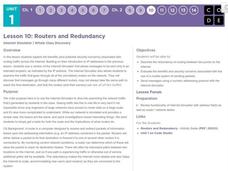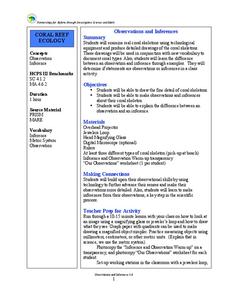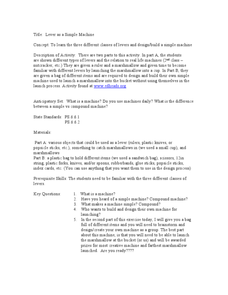Curated OER
Exploring the Beach
Students explore the beach. In this marine habitat lesson, students inspect sand grains, design beach profiles, classify marine life, and examine natural beach habitats. Students use spreadsheets to record data from their activities at a...
Alabama Learning Exchange
Peeking At Pumpkins
Young scholars listen to a read aloud about the life cycle of the pumpkin and discuss the process. They complete a life cycle booklet.
Curated OER
Sheffield Island Adaptation Activity
You don't have to visit The Maritime Aquarium to use this plan, but you would need to find a location where a variety of bird species live, re-write the activity worksheet to incorporate the local species, and purchase field guides for...
Curated OER
Mitosis and Cancer - Biology Teaching Thesis
Observe onion root cells undergoing mitosis underneath a light microscope and determine the phase of mitosis the cells are in. High schoolers draw a sketch of the mitotic cells, explore why cells undergo mitosis and learn how...
California Academy of Science
The Heat is On: Cause and Effect and Climate
The higher the number of letters in the final word for the National Spelling Bee, the higher the number of people killed by venomous spiders. Obviously, those two facts correlate, but no causation exists. Scholars view data based on...
Code.org
Routers and Redundancy
How are messages to the right recipient? Introduce the concept of routing Internet traffic by drawing a comparison to sending a letter. Groups use the Internet Simulator program to send messages to others using the same router...
Curated OER
African Americans in Science
Students examine the life of renowned African American scientists. In this science literacy lesson, students explore a website containing profiles and achievements of past and present African American scientists. They prepare a poster...
Curated OER
Hopper Hunt: IPM Decision-making in Alfalfa
Students describe migrations and life cycle pattersn of a key alfalfa pest, the Porato Leafhopper. They define the Economic Inquiry Level and Economic Threshold. Students evaluate data in relation to profit as it applies to IPM. They...
Curated OER
Observations and Inferences
Students examine coral skeletons. In this science lesson, view real coral skeletons. Students explain the differences between an observation and an inference. Students draw a coral skeleton.
Curated OER
The Giving Tree Gives
Young scholars study both poetry and science in this language arts activity for early elementary, Special Education, and LEP students. They listen to Shel Silverstein's, The Giving Tree, and discuss its contents. They graph apple types,...
Curated OER
Geneticist for a Day
Students discuss and compose a document discussing the transmission of the Huntington's gene- dominant or recessive, sex linked, etc. Additionally, they ought to consider Dr. Wexler's own odds for contracting the disease.
Curated OER
Where Did That Curly Hair Come From?
Students pronounce (as best as they can) the scientific term used in explaining heredity. They study the meaning and/or significance of these genetic terms and use these words in sentences relating to the information taught in the unit.
Curated OER
The Sun-Earth Connection
Third graders research about the location of different planets from the sun. For this earth science lesson, 3rd graders discuss the weather in their place and identify common weather terminologies. They explain how tornadoes form and...
Curated OER
Motion
Sixth graders read about and study motion. They conduct a lab in which they calculate speed using track records at their school. They graph the results and then invite a guest speaker (an officer from the local police department) who...
Curated OER
Estuary and Watershed
Students investigate the San Francisco Bay Estuarine Research Reserve and watershed. For this estuary and watershed lesson plan, students complete 4 activities to better understand estuarine systems. They include studying the San...
Curated OER
Gravity, Angles, and Measurement
Students relate math to real life scenarios. In this geometry instructional activity, students launch a ball tracking each launch using a graph. They analyze their data for speed, angles and distance, trying to improve on each launch.
Curated OER
An Introduction to Sensors
Students research the International System (SI) of units of measurements. They make measurements using the metric system. They study key concepts used in building and use of sensors, how sensors work and their role in measuring...
Curated OER
Basics of Archaeology
Students identify what and how to complete an Archaeological excavation is conducted. They identify the transition from one layer to the next more easily if the colors of the layers are different. When creating a dig, the teacher...
Curated OER
Lever as a Simple Machine
Students study the three different types of levers and develop a simple machine. In this levers and simple machines lesson, students look at different types of levers, and experiment with a ruler and a marshmallow to determine how they...
Curated OER
Circumference Review
In this circumference lesson plan, learners review how to find the diameter and circumference of a circle, they apply their skills to a real life application. Young scholars are presented with the task of determining the circumference of...
Curated OER
Energy Content of Foods
Learners collect data, organize and analyze the data and compare it to real life scenarios. This assignment requires two class periods.
Curated OER
Ecology and Life Interactions
Students discuss the hierarchy of an ecosystem. They are asked what are the optimum conditions that support human life? Students are asked what are their personal "optimum conditions" are. They are given the following as the question...
Curated OER
Science: Exploration Tubs
First graders develop skills of scientific inquiry. They determine which objects float and which sink.
Mary Pope Osborne, Classroom Adventures Program
Mummies in the Morning Egyptian pyramids, hieroglyphics
Visit the Magic Treehouse and take your class on a trip through time with a reading of the children's book Mummies in the Morning. Using the story to spark an investigation into Egyptian culture, this literature unit engages...

























